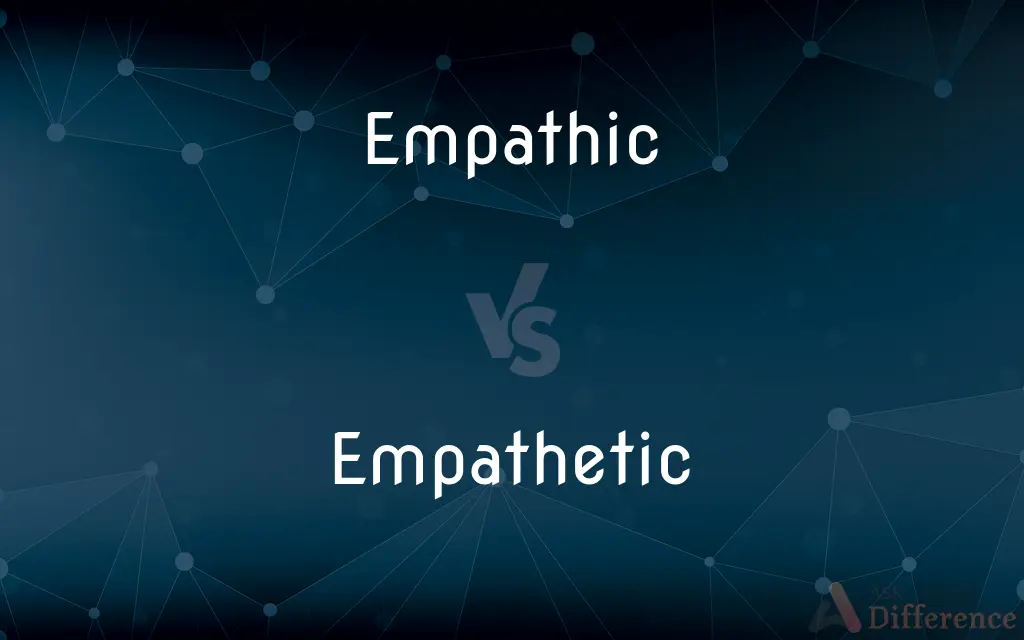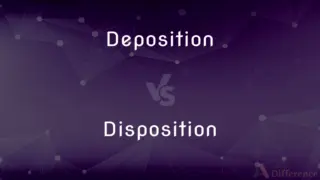Empathic vs. Empathetic — What's the Difference?
Edited by Tayyaba Rehman — By Fiza Rafique — Updated on October 12, 2023
Empathic and Empathetic both relate to the ability to understand others' feelings but are used in slightly different contexts, with "empathic" often used in psychological settings.

Difference Between Empathic and Empathetic
Table of Contents
ADVERTISEMENT
Key Differences
Empathic and Empathetic, although closely related and often used interchangeably, do bear nuanced differences in usage and contexts. Empathic typically leans more towards describing a psychological or therapeutic capacity to understand another person’s experience or emotions. In contrast, Empathetic tends to span a broader, everyday understanding and sharing of feelings.
Empathic, possessing a slightly more formal and clinical tone, is frequently employed within psychological, therapeutic, or clinical contexts. It underscores an individual's ability to comprehend and share another person's mental or emotional state. On the other hand, Empathetic encompasses a general ability to understand and share the feelings of another, not strictly bound to clinical settings.
When identifying someone as Empathic, it may subtly emphasize their intuitive, often psychologically insightful capacity to grasp the emotions or mental states of others. In comparison, labeling someone as Empathetic might suggest a kindly, relatable ability to understand and share in the emotional experiences of others without the same clinical implication.
In professional settings, particularly in psychology or counseling, an Empathic individual is seen as possessing an innate, even intuitive, ability to deeply understand and engage with the emotional and mental experiences of others. Conversely, describing someone as Empathetic in varied contexts, from casual to somewhat professional, suggests an open, emotional receptiveness and understanding towards others’ feelings and situations.
The distinction between Empathic and Empathetic, though subtle, lies in the depth and context of understanding and sharing emotions: the former often suggesting a profound, intuitive, or clinical understanding, while the latter implies a general, relatable emotional understanding and sharing.
ADVERTISEMENT
Comparison Chart
Typical Usage
More formal, clinical
General, broader contexts
Context of Use
Often in psychological or therapeutic contexts
In everyday language
Connotation
Slightly more intuitive or insightful
Kindly and understanding
Example of Use
An empathic therapist
An empathetic friend
Formal Writing
More common
Less common
Compare with Definitions
Empathic
Empathic may imply a professional depth in emotional understanding.
The empathic counselor could sense the unspoken feelings of clients.
Empathetic
Empathetic conveys a general emotional understanding.
Empathetic listeners can make difficult times more bearable.
Empathic
Empathic conveys psychological insight into emotions.
His empathic approach brought breakthroughs in therapy sessions.
Empathetic
Empathetic implies a compassionate resonance with emotions.
The empathetic teacher was beloved by students.
Empathic
Empathic reflects an insightful grasp of mental states.
Empathic individuals often work well in therapeutic professions.
Empathetic
Empathetic signifies an understanding and sharing of feelings.
She was empathetic toward her friend's struggles.
Empathic
Empathic indicates a deep, intuitive understanding.
Her empathic abilities were renowned in the field of psychology.
Empathetic
Empathetic reflects kindly, relatable emotional sharing.
His empathetic nature made him a go-to person in times of trouble.
Empathic
Empathic signifies a profound resonance with others’ emotions.
Being empathic allows psychologists to navigate delicate emotional territories.
Empathetic
Empathetic indicates an ability to relate emotionally.
Being empathetic enables you to connect with diverse individuals.
Empathic
Showing an ability to understand and share the feelings of another
An attentive, empathic listener
Tears may elicit an empathic response in people
Empathetic
Showing an ability to understand and share the feelings of another
She's compassionate and empathetic towards her daughter
I have been touched by the empathetic response to my bad luck
Empathic
Of, relating to, or characterized by empathy.
Empathetic
Empathic.
Empathic
Showing or expressing empathy.
Empathetic
Showing empathy for others, and recognizing their feelings; empathic.
Empathic
(science fiction) Of, pertaining to, or being an empath: of or having the capability of sensing the emotions of others.
Empathetic
Showing empathy or ready comprehension of others' states;
A sensitive and empathetic school counselor
Empathic
Showing empathy or ready comprehension of others' states;
A sensitive and empathetic school counselor
Common Curiosities
Can Empathetic be used in a professional context?
Yes, but it doesn’t carry the same professional depth as Empathic.
Does being Empathic suggest a deep, intuitive understanding?
Yes, Empathic often implies a deep, sometimes intuitive grasp of emotions.
Is Empathetic widely used in everyday language?
Yes, Empathetic is commonly used to describe general emotional understanding.
Is it crucial to differentiate between Empathic and Empathetic in casual conversation?
Not always, as they’re commonly used interchangeably in informal contexts.
Is Empathic more commonly used in psychological literature?
Yes, Empathic is often utilized to describe a therapeutic understanding of emotions.
Are Empathic and Empathetic interchangeable?
They're often used interchangeably but have nuanced differences.
Is Empathic related to Empathy?
Yes, Empathic refers to possessing the quality of empathy, especially in a deep or intuitive sense.
Can being Empathetic enhance personal relationships?
Definitely, as being Empathetic allows for emotional understanding and sharing.
Should I use Empathic to describe a skilled therapist?
Empathic is apt for describing therapists with a deep understanding of emotions.
Is Empathic more professional in connotation?
Yes, it's often used in a more clinical or psychological context.
Can Empathetic suggest a friendly, relatable nature?
Absolutely, Empathetic often conveys a kindly, understanding demeanor.
Can Empathetic suggest a general emotional receptiveness?
Yes, Empathetic usually implies an ability to understand and share varied emotions.
Does Empathic imply an ability to discern unspoken emotions?
Often yes, an Empathic individual might intuitively understand unvoiced feelings.
Is it wrong to use Empathetic in a professional or clinical context?
Not wrong, but Empathic might be preferred for its professional connotation.
Is Empathic more likely to appear in formal writing?
Yes, Empathic may be preferred in formal or professional writing, especially in psychological contexts.
Share Your Discovery

Previous Comparison
Panel vs. Pannel
Next Comparison
Deposition vs. DispositionAuthor Spotlight
Written by
Fiza RafiqueFiza Rafique is a skilled content writer at AskDifference.com, where she meticulously refines and enhances written pieces. Drawing from her vast editorial expertise, Fiza ensures clarity, accuracy, and precision in every article. Passionate about language, she continually seeks to elevate the quality of content for readers worldwide.
Edited by
Tayyaba RehmanTayyaba Rehman is a distinguished writer, currently serving as a primary contributor to askdifference.com. As a researcher in semantics and etymology, Tayyaba's passion for the complexity of languages and their distinctions has found a perfect home on the platform. Tayyaba delves into the intricacies of language, distinguishing between commonly confused words and phrases, thereby providing clarity for readers worldwide.
















































